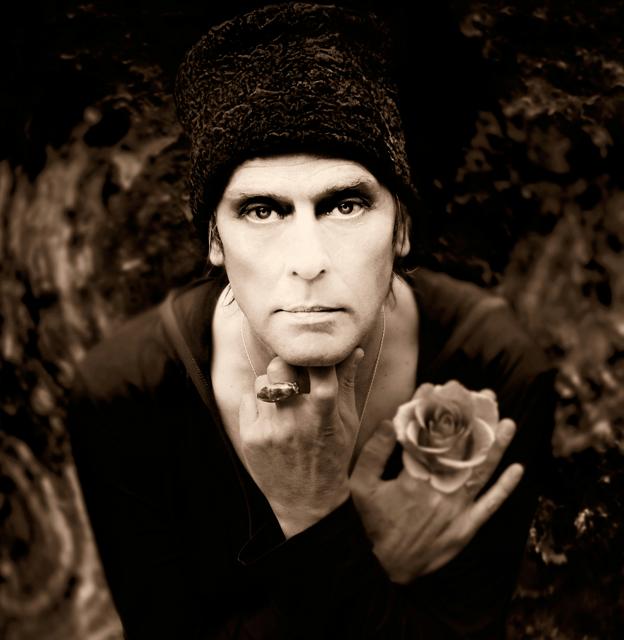"I don't feel cynical at all. I feel as vital and valid as ever," says musician Peter Murphy.
Over the years he's been many things to many people: The frontman for British post-punk band Bauhaus, the harbinger of gothic rock, an underappreciated solo act, a world-music maverick. If his career began on a lark (according to the book Dark Entries: Bauhaus and Beyond, Murphy was working in a factory and was tapped because he had the right look), as soon as he picked up the mic, he never looked back.
Part glam, part rock-noir, Bauhaus lasted a mere four years (with a few subsequent reunions) but left an indelible mark on music. It inspired a profusion of bands, including Nine Inch Nails, whose frontman, Trent Reznor, has become a regular collaborator with Murphy. Bauhaus is also credited for igniting goth — the music and its accompanying look. Though Murphy insists that goth was never his thing. "I want to to deny it immediately while not sounding bitter or unappreciative or negative," he says of the "Father of Goth" moniker. "But it's a great compliment, so I'm careful not to stamp on anybody's thing."
Similarly, the darkly haunting Bauhaus song "Bela Legosi's Dead" neatly tied Murphy to the vampire archetype despite that it was but one song in a 30-year career. Recently, Murphy capitalized on that association, landing a cameo in the Twilight series film Eclipse and handily introducing himself to a new generation of listeners.
Of course, it's more than a song. Murphy's velvet purr alone carries all the drama and intrigue of an interview with Lestat himself; on stage the singer's carved cheekbones, luminous gaze and the narcotic embrace of his baritone are spellbinding. Three decades doesn't seem to have lessened Murphy's affect (Google video footage of him and Reznor performing "Bela Legosi" with TV on the Radio — Murphy languidly draws from a cigarette and scatters rose petals before launching into a searing verse) though he does seem bemused by the status bestowed upon him by history.
"I play with my own sense of image as an icon," he says. For instance, the song "Velocity Bird" (which he's been playing on recent tours) is "in the personal tense. I'm telling people my own qualities. It's kind of like I am a character."
Of his long-awaited studio album, Ninth, to be released in June, he says, "I've written like that. I've written from myself."
The album, finished a couple of years ago, has been in limbo while Murphy sought the right label and management. Past solo projects were colored by Murphy's life in Istanbul, where he's been based at least part time since '92. Dust, from 2002, echoes with ambient electronics, pulsing hand drums and nods to Murphy's interest in mystic Sufism. His most commercially successful album, Deep, from 1990 marries the most brooding pop melodies with the aching poetry of songs like "A Strange Kind of Love." Ninth, he says, will follow neither set of footprints.
Instead, recorded in a repurposed church in Woodstock, N.Y., with producer David Baron, Ninth references "early Bauhaus in a sense. Not exactly, not being too esoteric, too eclectic," says Murphy. "Although, naturally, my work does go that way." Indeed, spirituality is a far more consistent exploration in the musician's work than, say, the undead.
"I write about my personal subconsciousness. Never proselytizing but giving out ideas and notions within stories," he says. "My lyrics have always had an esoteric quality to them. I don't feel that it's necessary for me to explain those because, rather, like a painting, you shouldn't have to."
Of Ninth he does reveal that it was important for him to work with a full band and "I wanted it to sound very guitar-oriented and to have an organic-played feeling to it."
Murphy's not a fan of working remotely on an album, even though technology has made that possible. "It's like making love over the telephone," he says. Instead, Ninth was recorded with all the players in a room, over the span of a week. "You can become too overindulgent in what you're doing and mess it up," says Murphy. "I didn't want to be too precious about it."
And now he's ready to tour those songs — though Murphy has often maintained that he'll also continue to play from his back catalog as well. In his words, he wears the mantle of Bauhaus which (rather like the immortal beings linked to Murphy's image) "has a long shelf life. Because I think it's more than just music, there's a character behind it," he says. "I do feel that it's still relevant and I can make it relevant every night that I perform."
— Alli Marshall can be reached at amarshall@mountainx.com.
who: Peter Murphy, with Livian
where: The Orange Peel
when: Tuesday, March 29 (9 p.m., $24 advance/$26 doors. theorangepeel.net)




Before you comment
The comments section is here to provide a platform for civil dialogue on the issues we face together as a local community. Xpress is committed to offering this platform for all voices, but when the tone of the discussion gets nasty or strays off topic, we believe many people choose not to participate. Xpress editors are determined to moderate comments to ensure a constructive interchange is maintained. All comments judged not to be in keeping with the spirit of civil discourse will be removed and repeat violators will be banned. See here for our terms of service. Thank you for being part of this effort to promote respectful discussion.